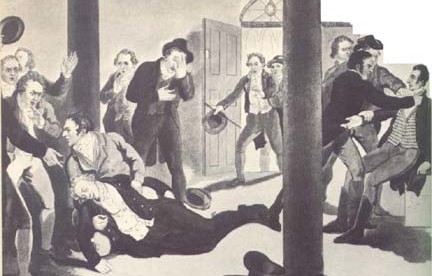The Lobby

In about 1870 Speaker Denison stopped members of the public from wandering into the Members Lobby to “inconvenience” MPs. In future only those registered on a list kept by the Serjeant at Arms – including certain privileged reporters – would be allowed access.
By the end of the 19th century lobby journalism had established a distinct style: where gallery reporters merely chronicled what was said, lobby correspondents tried to anticipate events.
Their colleagues in the gallery dismissed the work of lobbyists as “fiction, supposition and exaggeration”.
But the Lobby, though always a wholly owned subsidiary of the Press Gallery, soon emerged as an independent force, with its own committee and rules.
During the General Strike of 1926, the Cabinet decided to hold discreet daily briefings with selected journalists on an unattributable basis.
Within a few years a secretive system was in place which favoured the journalists – only 45 of them in the 1930s – just as much as the politicians.
Members of the Lobby were enjoined to keep the very existence of the system secret.
The Lobby’s obsession with secrecy, encouraged by successive governments, could not last. When it suited him, Harold Wilson praised it as “an essential thread of precious metal in our British parliamentary democracy”, before deciding it was part of a vast conspiracy against him.
Under Margaret Thatcher, her press secretary Bernard Ingham used the Lobby to demolish “semi-detached” members of the Cabinet.
When the new Independent announced in 1986 it would not join the system, the Guardian and the Scotsman followed suit.
It was the previous cabinet secretary Lord Gus O’Donnell, then John Major’s spokesman, who ended Lobby secrecy. He agreed to allow lobby briefings – until then so secret their very existence could not be reported – to be attributed to “Downing Street sources”.
Alastair Campbell finished the job. Labouring under allegations of excess “spin”, he began by attributing briefings to “the Prime Minister’s official spokesman”. Then, in 2002, he opened the briefings to specialist and foreign journalists.
“Lobby rules” – don’t name your source – still apply in dealings with MPs, but the days of exclusivity and enforced secrecy are gone.
